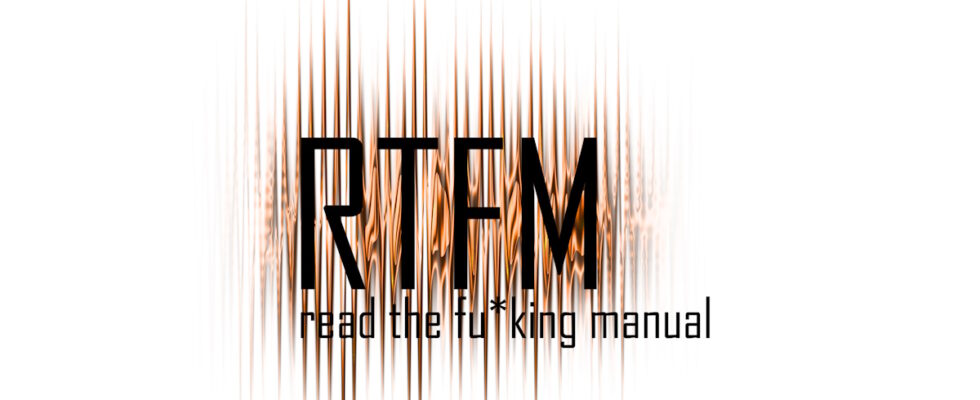The reader will probably not be old enough to remember a practice that was very common in the 90s and early 2000s: the famous RTFM (Read the fucking manual).
Nostalgia for the Old World
It was a common response to rudimentary questions. As brutal as it was, it had the advantage of avoiding nervous breakdowns. A vestige of a time when having a computer and an Internet connection made you a special being, it forced you to search first, before asking questions. We were trained not to write “how does it work? [insérer un outil] ? “, but “I have consulted the documentation of[insérer un outil]and I did not understand this aspect, if someone can enlighten me, I will be grateful.”
Paradoxically, it is in the free software community that RTFM was most successful and we know its effects. Novices have turned away from free, in favor of the owner, more noob-friendly.
Today, two trends coexist: extreme benevolence, which sees in each user someone who has never used a computer in their life, and RTFM 3.0, which frequently boils down to ” used[insérer telle technologie]”. In the middle, emptiness. If RTFM has somewhat fallen into disuse in the IT field, there is one area in which it is becoming urgent to apply it: the press.
Multitasking journalism
In the early days of consumer computing, only a few major newspapers and media outlets could afford to have a website. Technologies, means, access have evolved. Today, it is no longer really necessary to have a real war machine to inform.
However, the reader, who also wants to be a citizen, has not evolved. Worse still, he regressed. Are smartphones to blame? To press aggregators? The compression of time? To the reduction of financial resources? All this at once? We could do doctoral theses on the reasons why we are facing a paradoxical situation.
We have never had so many information channels and we have never had so many misinformed people. Producing quality information is no longer enough. Each journalist must now be their own community manager, their own community manager to make their work known.
Toxic kindness
Because, yes, most people don’t go further than Google News or push notifications on smartphones and imagine getting information by reading and relaying Twitter accounts that steal the work of journalists. Another phenomenon directly linked to social networks: to be visible, you have to mass produce. However, when it comes to information, mass rarely means quality. Choosing to specialize and therefore to cut yourself off from immediacy amounts to cutting yourself off from part of the readership.
This is how we find ourselves face to face with Marie-Karen, who sees no further than the tip of her nose, who scolds you because colleagues from another editorial team did not correctly process technical information. . The same Marie-Karen who herself admits that she does not seek information or finance it. Marie-Karen considers subscribing to a social network account to be the pinnacle of effort. It’s well known: the media and especially journalists live on fresh water. For love, you have to iron out: you don’t do this job to be loved.
The reality is that we have never applied RTFM to the press sector and perhaps we should have. From the start of consumer computing, we preached kindness, we brought everything on a platter to readers. We pre-chewed everything for them. So the reader no longer searches. He expects the press to come and sing the news of the day under his windows. News that must be free, of quality, without advertising, without state subsidies or corporate sponsorship and not belonging to a conglomerate owned by a billionaire.
Information for ducks
The world of the press must undergo its revolution, in many areas. Certain practices must absolutely evolve, if we do not want the press professions to die. At the risk of stating the obvious, in the press, there are not only journalists. But, the reader must also do their part.
Doing your part involves monitoring beyond Google News. This means stopping sharing and reading Twitter accounts, which only steal editorial work to make a few bucks. This means stopping sharing screenshots of articles, whether they are open access or behind a subscription. And why even read the articles. This also requires a change in behavior. Journalists are not crying offices. There is no point in telling us your feelings about this or that news on a social network. We have no control over events. Our job is to state and contextualize them. Doing your part involves looking for a minimum.
By absolutely wanting to gain a readership, we were too benevolent. We considered that we were not facing adults, but children, who we had to guide. That we had to respond to all requests, such as “why don’t you investigate this or that subject?” “. That we had to be available at all times. Even at fast food restaurants, they have schedules and days off. Because that’s exactly what we’ve become: fast food. The difference is that when you order a burger at the local McFast, you have to pay.
Of course, the press is not an essential area. If journalists change jobs, it will not change anything for them, since the mental gymnastics they have acquired will not disappear overnight. But, for readers, it might be funny to have only expensive media on one side and sensationalist canards on the other.
